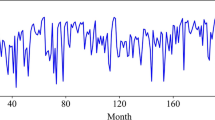Abstract
In order to simulate the situation of freight flow in overlapping hinterland, we forecast the throughput of port and introduce the game theory to improve it. On the basis of this, a multimedia Bayesian regression model is established. On the basis of the existing port throughput prediction theory and actual situation of ports in China, through the analysis of China’s coastal port cargo and impact, a coastal port cluster cargo throughput prediction model, improve China’s coastal port throughput prediction precision and accuracy, which provides more reliable reference for China’s coastal areas port investment planning. The main features of this model are as follows. For the first time, we analyze and predict the throughput of coastal ports from the point of view of the composition of port throughput. Considering the coordination relationship between major coastal port cargo throughput under, we use game theory, to deal with the port cargo throughput index, the maximum information is retained to ensure the accuracy of prediction model. The model is convenient and flexible, and can be extended to the throughput prediction of a single port or port group. It can be extended to the prediction problem with more time series indexes under multimedia environment.




Similar content being viewed by others
Change history
20 September 2022
This article has been retracted. Please see the Retraction Notice for more detail: https://doi.org/10.1007/s11042-022-13998-3
References
Chen HH, Li Y, Jiang Y, Ma Y, Vucetic B (2015) Distributed power splitting for SWIPT in relay interference channels using game theory. IEEE Trans Wirel Commun 14(1):410–420
Cui, K. and Qin, X., 2017. Virtual reality research of the dynamic characteristics of soft soil under metro vibration loads based on BP neural networks. Neural Computing and Applications, pp.1–10
Cui Y, Yang H (2017) Dissecting genomic imprinting and genetic conflict from a game theory prospective: Comment on:“Epigenetic game theory: How to compute the epigenetic control of maternal-to-zygotic transition” by Qian Wang et al. Phys Life Rev 20:161–163
Duan H, Li P, Yu Y (2015) A predator-prey particle swarm optimization approach to multiple UCAV air combat modeled by dynamic game theory. IEEE/CAA J Automatica Sinica 2(1):11–18
Eid MS, El-adaway IH, Coatney KT (2015) Evolutionary stable strategy for postdisaster insurance: Game theory approach. J Manag Eng 31(6):04015005
Greiner D, Periaux J, Emperador JM, Galván B, Winter G (2017) Game theory based evolutionary algorithms: a review with nash applications in structural engineering optimization problems. Arch Comput Methods Eng 24(4):703–750
Huh JH, Seo K (2015) Hybrid advanced metering infrastructure design for micro grid using the game theory model. Int J Software Eng Its Appl 9(9):257–268
Khan Y, Mirzabeigy A (2014) Improved accuracy of He’s energy balance method for analysis of conservative nonlinear oscillator. Neural Comput Applic 25(3–4):889–895
Mekonnen T, Porambage P, Harjula E, Ylianttila M (2017) Energy consumption analysis of high quality multi-tier wireless multimedia sensor network. IEEE Access, 5:15848–15858
Mohamad ET, Faradonbeh RS, Armaghani DJ, Monjezi M, Majid MZA (2017) An optimized ANN model based on genetic algorithm for predicting ripping production. Neural Comput Applic 28(1):393–406
Wang T, Sun Q, Ji Z, Chen Q, Fu P (2016) Multi-layer graph constraints for interactive image segmentation via game theory. Pattern Recogn 55:28–44
Yang XS, Deb S (2014) Cuckoo search: recent advances and applications. Neural Comput Applic 24(1):169–174
Zhang A, Gao X (2018) Data-dependent kernel sparsity preserving projection and its application for semi-supervised classification. Multimedia Tools and Applications, 1–17. https://doi.org/10.1007/s11042-018-5707-0
Acknowledgements
Research for this paper was funded by the National Natural Science Foundation of China (NO.41401120, 51409088) and Fundamental Research Funds for the Central Universities (Project No. 2014B00214). The authors thank every teacher of research institute, for their comments and suggestions.
Author information
Authors and Affiliations
Corresponding author
About this article
Cite this article
Jiang, L., Wang, J., Jiang, H. et al. RETRACTED ARTICLE: Prediction model of port throughput based on game theory and multimedia Bayesian regression. Multimed Tools Appl 78, 4397–4416 (2019). https://doi.org/10.1007/s11042-018-5766-2
Received:
Revised:
Accepted:
Published:
Issue Date:
DOI: https://doi.org/10.1007/s11042-018-5766-2




